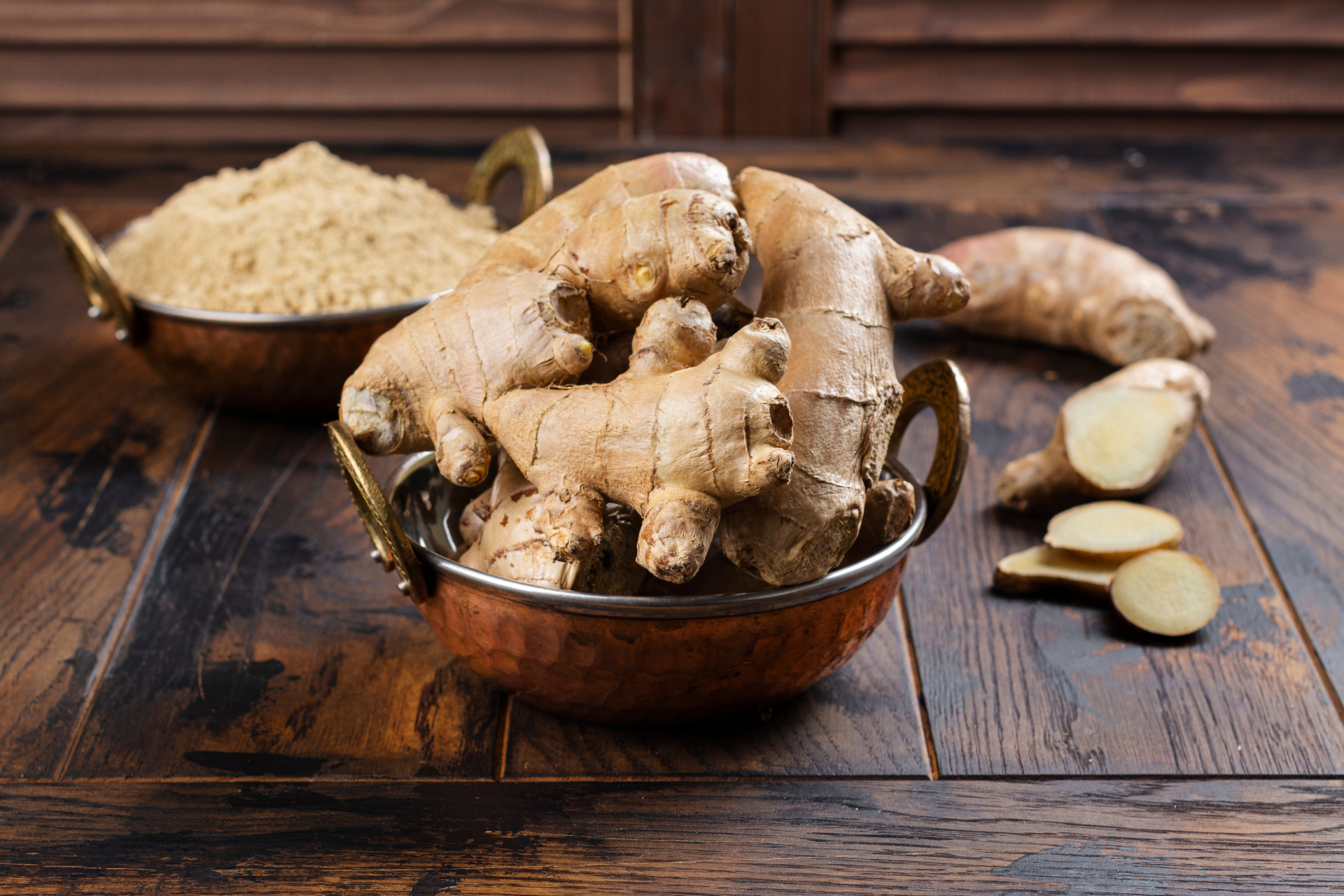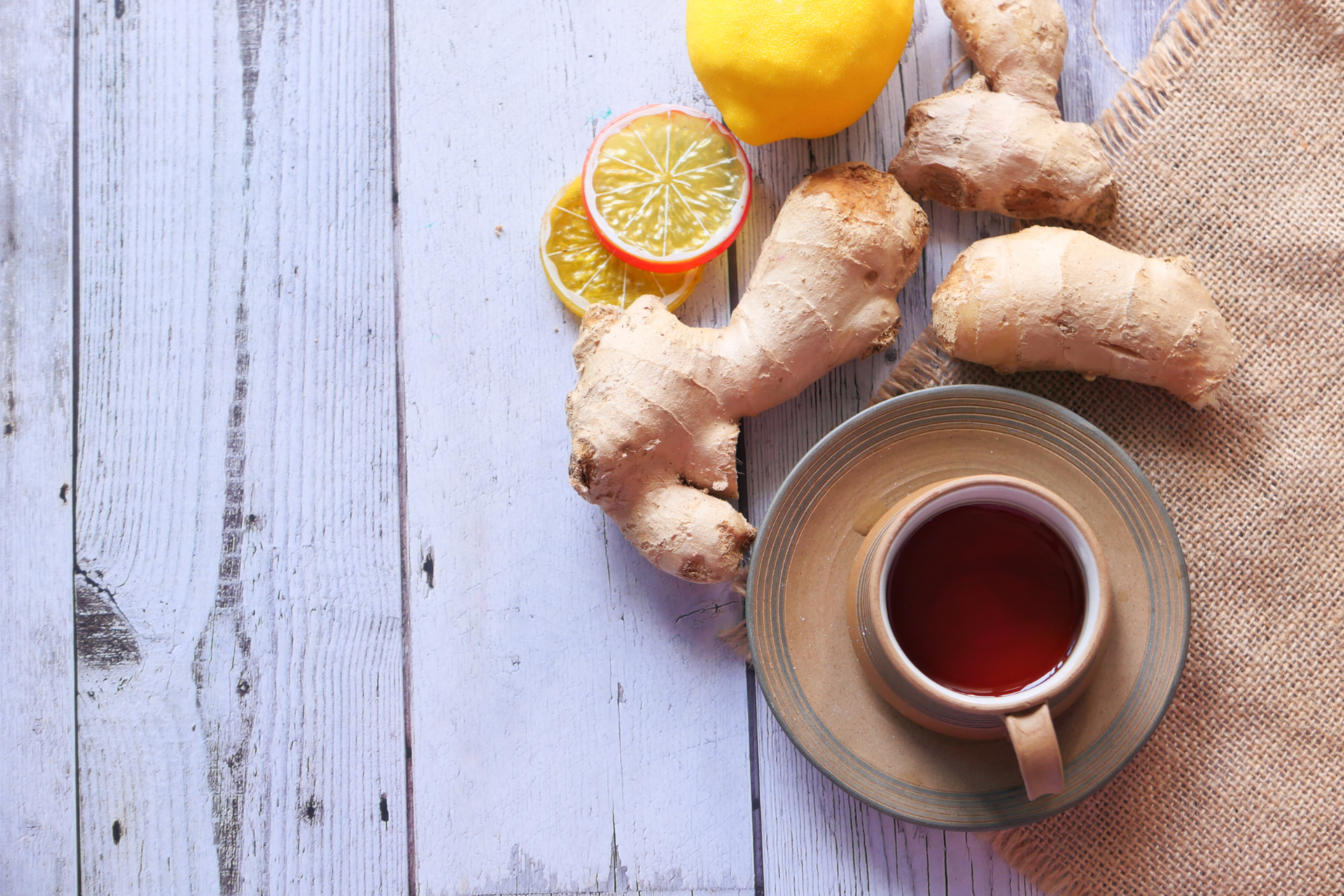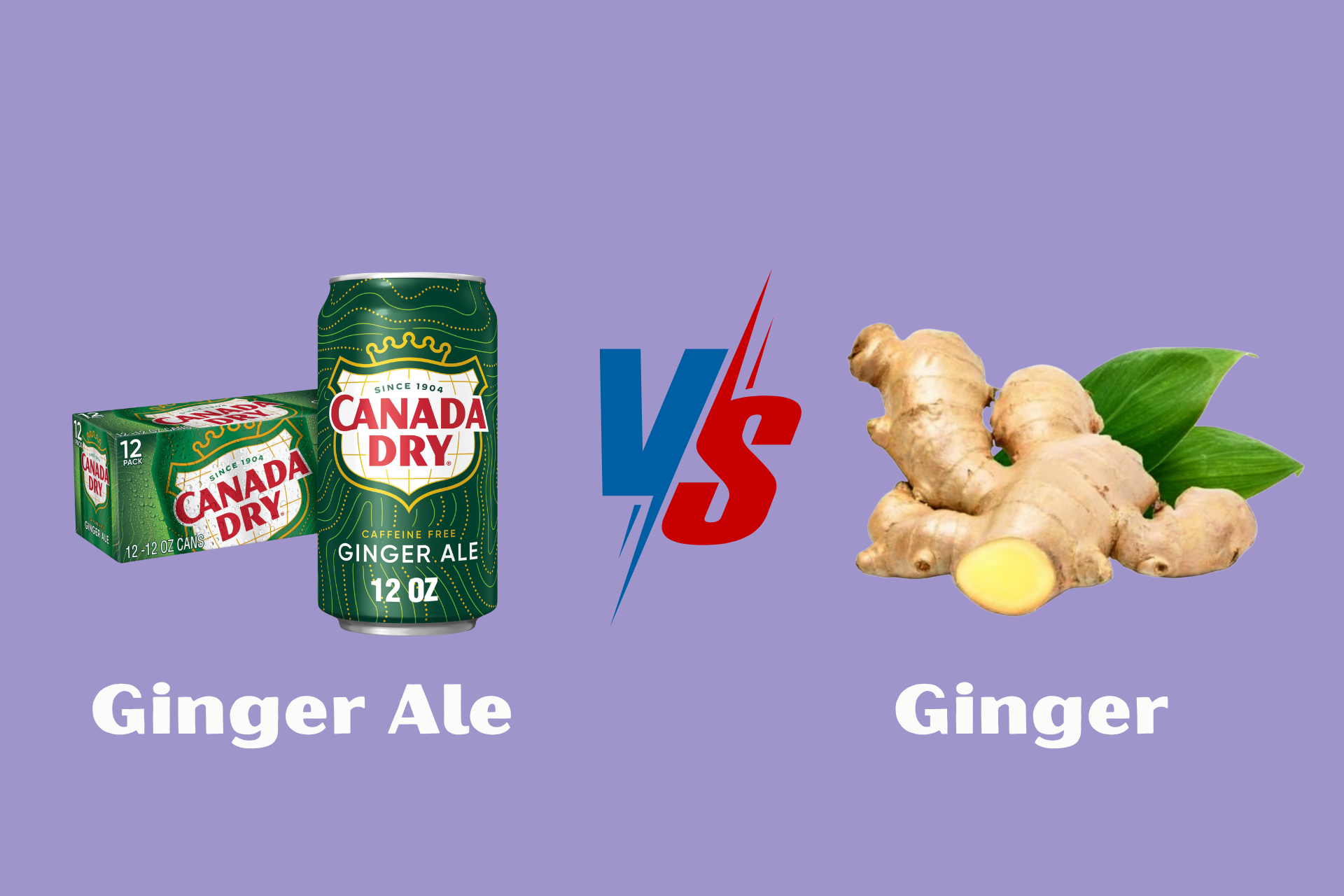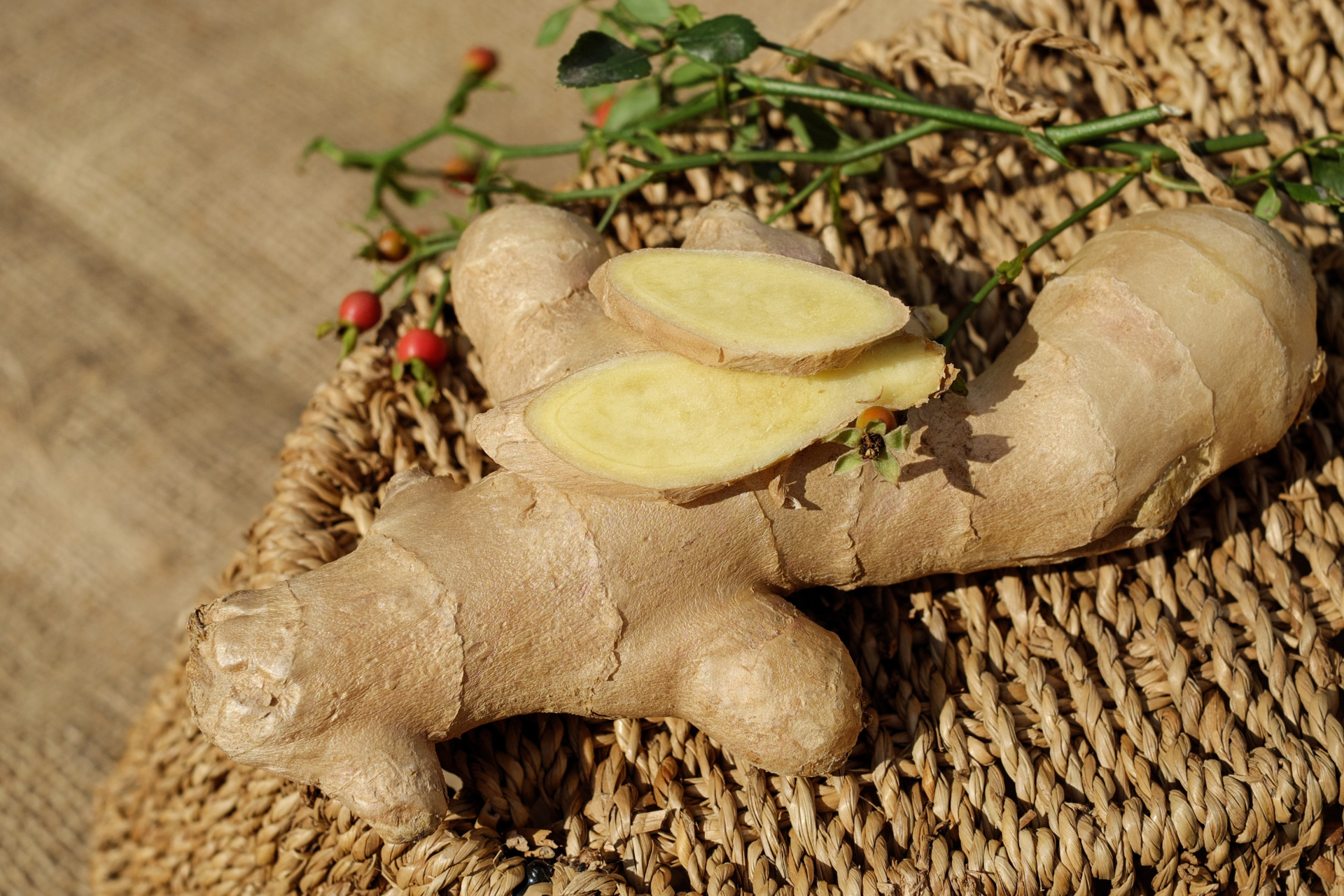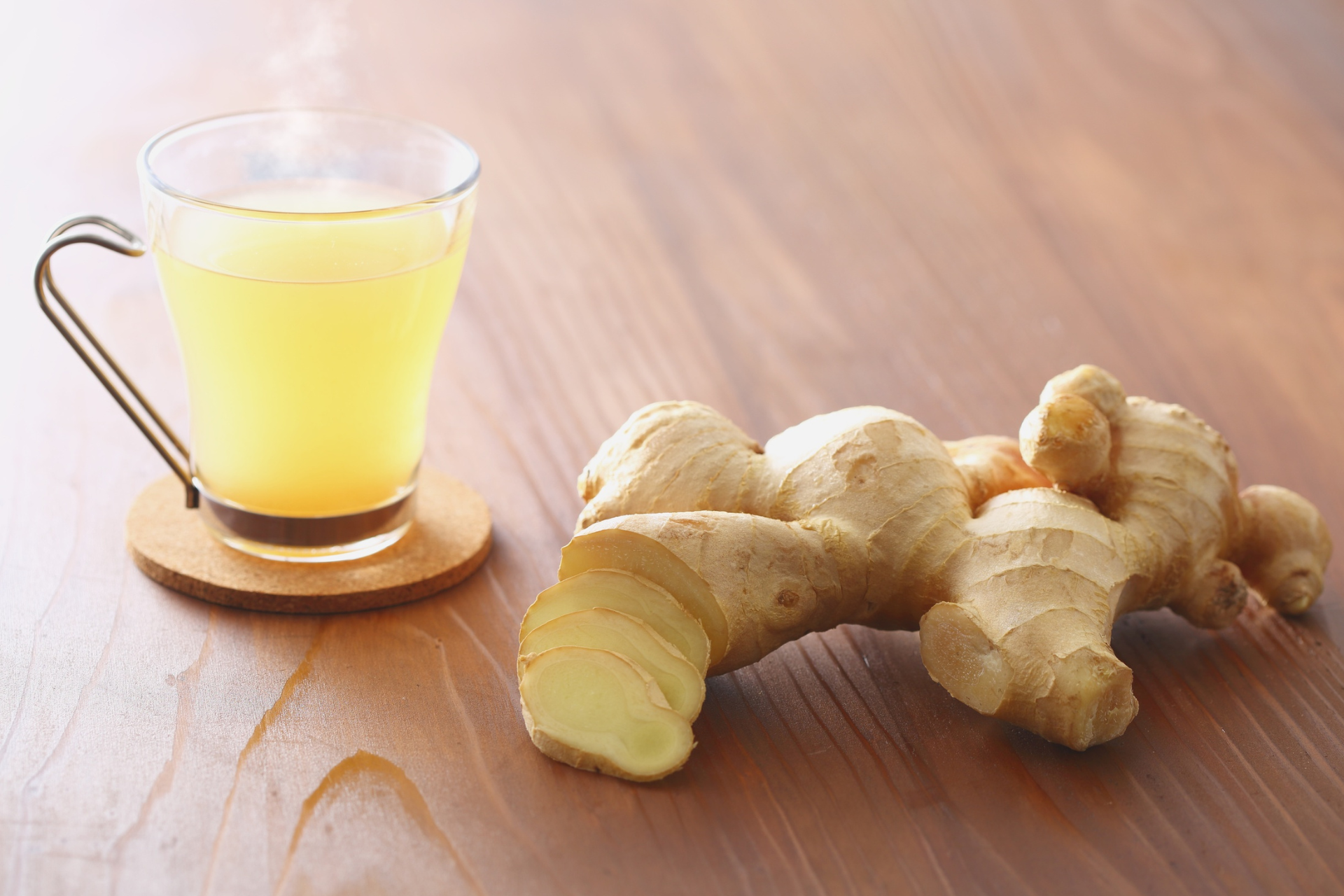The health benefits of ginger have been celebrated for thousands of years, making it a staple in both traditional medicine and modern wellness routines.
Used across various cultures for its powerful healing properties, ginger has transformed from a simple root into a globally recognized superfood. Today, ginger is not just a kitchen spice but a therapeutic agent backed by science and loved for its potent health effects.
In an era of growing interest in natural remedies and holistic health, ginger remains a popular choice. Whether you’re sipping ginger tea, adding grated ginger root to a stir-fry, or taking a supplement, you’re engaging with a plant that offers a host of powerful benefits. But what exactly are the benefits of ginger, and why is it so revered? Let’s explore.
What Is Ginger?
Ginger, or Zingiber officinale, is a flowering plant native to Southeast Asia. The part most commonly used is the rhizome, often referred to as ginger root. This knobby, aromatic root is prized for its distinctive flavor and broad medicinal applications.
Ginger can be consumed in many forms: fresh, dried, powdered, pickled, as an oil, or as a juice extract. Each form has specific uses. Fresh ginger root is commonly used in culinary dishes, while powdered ginger appears in baking and spice blends. Ginger oil and extracts are often used in supplements or topically.
In both Eastern and Western traditions, ginger has been valued for its ability to stimulate digestion, relieve nausea, reduce inflammation, and improve overall vitality. As we investigate the ginger health benefits, it becomes clear why this root has stood the test of time.
Ginger Nutrition
Understanding ginger nutrition facts helps explain why this root packs such a powerful punch. Ginger is low in calories but high in essential nutrients. It contains Vitamin B6, magnesium, potassium, manganese, and a bioactive compound called gingerol.
Gingerol is the main bioactive component in ginger, responsible for much of its medicinal power. It has strong anti-inflammatory and antioxidant effects, which contribute to ginger’s therapeutic versatility. Gingerol’s ability to combat oxidative stress is one of the key reasons for the many ginger root benefits.
Besides micronutrients, ginger also contains small amounts of niacin, phosphorus, and iron. Its potent phytochemicals and antioxidants make it a nutrient-dense choice for those seeking natural remedies.
Top 20 Proven Benefits of Ginger
1. Contains Gingerol: A Potent Anti-inflammatory and Antioxidant
The core of ginger’s benefits lies in gingerol. This compound plays a central role in reducing inflammation and oxidative stress. Inflammation is linked to numerous chronic diseases like arthritis, heart disease, and even cancer. By consuming ginger regularly, you may be supporting your body’s defense against inflammation at the cellular level.
Studies have shown that gingerol can reduce inflammatory markers and inhibit the production of free radicals. This makes ginger especially effective for people with inflammatory conditions or oxidative damage due to stress, pollution, or poor diet.
Antioxidants are crucial in slowing the aging process and protecting cells. Ginger’s antioxidant profile helps fortify the immune system, making it an ideal supplement for long-term health.
Whether used in food or supplements, gingerol-rich ginger is one of the most potent anti-inflammatory agents in the natural health world.
2. May Help Relieve Nausea
Ginger is a well-known natural remedy for nausea and vomiting. Its anti-nausea properties make it especially effective for morning sickness during pregnancy, motion sickness, and nausea related to chemotherapy.
Clinical studies confirm that even small doses of ginger can significantly reduce nausea symptoms. Its gentle nature makes it safe for pregnant women when used in moderation.
What does ginger do for the body in this case? It accelerates gastric emptying and blocks the brain’s nausea center, offering quick and safe relief.
Whether you sip on ginger tea, chew ginger candies, or take capsules, ginger remains one of the best remedies for queasiness.
3. May Support Weight Loss
Among the benefits of ginger, weight loss support is a major one. Ginger may help regulate metabolism, reduce appetite, and improve fat burning.
Research suggests ginger helps increase thermogenesis (the body’s calorie-burning process) and may reduce feelings of hunger. This can be particularly helpful for those on a weight management plan.
Furthermore, ginger supports digestive efficiency, ensuring that your body processes food more effectively. Improved digestion often correlates with better weight control.
Adding ginger to your daily routine could give your body the metabolic edge it needs to shed extra pounds naturally.
4. Can Help with Osteoarthritis
Ginger’s powerful anti-inflammatory properties make it a valuable treatment for osteoarthritis, particularly of the knee. It reduces pain and stiffness in joints by inhibiting the production of inflammatory chemicals.
Several clinical trials have shown significant improvements in mobility and pain levels in osteoarthritis patients who regularly consumed ginger extracts.
Topical applications of ginger oil may also provide localized relief when massaged into sore joints.
Whether taken orally or applied externally, ginger is a natural, side-effect-free aid for joint health.
5. May Lower Blood Sugar and Improve Insulin Sensitivity
One of the lesser-known ginger root benefits is its potential to regulate blood sugar. Studies indicate that ginger can reduce fasting blood glucose levels and improve insulin response.
This is great news for people with type 2 diabetes or those at risk. By stabilizing blood sugar, ginger can help prevent energy crashes and support metabolic health.
The anti-inflammatory effects also protect insulin-producing cells from damage, adding another layer of support for blood sugar balance.
Regular consumption of ginger may act as a protective measure against metabolic syndrome.
6. Supports Digestive Health
Digestion is one of the core areas where ginger shines. It stimulates saliva, bile, and gastric enzymes, all of which aid in the breakdown of food.
By enhancing digestive efficiency, ginger helps prevent common issues like bloating, gas, and indigestion. Its carminative properties make it a go-to remedy for stomach discomfort.
What is ginger good for? Many would say the gut. It soothes the intestinal tract, supports nutrient absorption, and relieves nausea simultaneously.
If you suffer from chronic digestive issues, incorporating ginger could drastically improve your gut health.
7. May Reduce Menstrual Pain (Dysmenorrhea)
Among ginger benefits for women, menstrual pain relief is perhaps the most appreciated. Ginger’s anti-inflammatory effects can help ease cramping and bloating associated with menstruation.
Studies show that ginger is as effective as some over-the-counter medications like ibuprofen when taken at the start of the menstrual cycle.
Ginger tea is a popular option for soothing period pain, as it delivers warmth and therapeutic compounds directly to the system.
Regular intake of ginger can lead to easier, less painful menstrual cycles over time.
8. May Help Lower Cholesterol Levels
High cholesterol is a major risk factor for heart disease. Ginger has been shown to reduce LDL (bad cholesterol) and raise HDL (good cholesterol), improving overall lipid profiles.
Ginger’s ability to inhibit lipid absorption in the intestine plays a role in maintaining healthy cholesterol levels.
Animal and human studies alike have shown promising results, supporting ginger as part of a heart-healthy diet.
Incorporating ginger daily can help keep your cardiovascular system in check.
9. May Reduce Cancer Risk
Ginger contains gingerol and other compounds with anti-cancer properties. These compounds may help inhibit the growth of cancer cells, particularly in the colon, pancreas, and breast.
Its antioxidant and anti-inflammatory actions protect cells from mutations that can lead to cancer.
Studies suggest that ginger may be especially useful in reducing inflammation in the gut, which is often a precursor to colorectal cancer.
While not a replacement for medical treatments, ginger can be a valuable preventative component of a cancer-conscious lifestyle.
10. May Improve Brain Function and Protect Against Alzheimer’s
Ginger’s neuroprotective benefits are gaining attention. Its antioxidants help reduce oxidative stress and inflammation in the brain, which are key contributors to cognitive decline and neurodegenerative diseases like Alzheimer’s.
Regular intake may enhance memory, focus, and reaction time. Some studies also show ginger helps boost brain-derived neurotrophic factor (BDNF), a key molecule involved in brain repair.
Is ginger good for you cognitively? Absolutely. Whether you’re aging or simply want to stay sharp, ginger offers brain-boosting potential.
The more you incorporate ginger, the better your brain can fight aging and degeneration.
11. Can Help Fight Infections
Ginger contains powerful antimicrobial compounds that help the body fend off infections. Its ability to inhibit the growth of various bacteria and viruses makes it a useful natural remedy for respiratory and oral infections.
One of the most well-known ginger health benefits is its use against the common cold. Ginger tea is frequently used to soothe sore throats and clear nasal congestion.
Additionally, studies have shown ginger can help combat gum disease and other bacterial issues in the mouth. Its anti-inflammatory effects also reduce swelling and discomfort caused by infections.
For those looking to bolster their immune system naturally, ginger is a top-tier ally. Including it in your daily diet can help ward off illness and support faster recovery when you’re sick.
12. May Treat Cold, Flu, and Respiratory Infections
Ginger has long been used in traditional medicine to treat colds and flu. Its warming properties help reduce chills, soothe sore throats, and promote sweating to lower fevers.
Ginger tea benefits include its ability to act as a decongestant and cough suppressant. This makes it ideal for relieving symptoms of bronchitis, sinusitis, and other upper respiratory infections.
The anti-viral and immune-boosting properties of ginger support quicker recovery times. It’s often combined with honey and lemon to amplify these effects.
Whether in a tea or inhaled through steam, ginger offers an all-natural approach to combating seasonal illnesses.
13. May Be Remedial for Stomach Ulcers
One of the lesser-known yet valuable ginger benefits is its potential role in protecting the stomach lining from ulcers. Stomach ulcers, or gastric ulcers, can be caused by excessive stomach acid, infection with H. pylori, or long-term use of nonsteroidal anti-inflammatory drugs (NSAIDs). Ginger may offer protective effects that help reduce the risk of these painful sores.
Studies have demonstrated that ginger extract can inhibit the growth of H. pylori, the bacterium most commonly associated with ulcer formation. Its anti-inflammatory and antioxidant effects also help reduce gastric irritation and promote mucosal defense mechanisms.
What is ginger good for in digestive health? Aside from relieving indigestion and nausea, ginger increases mucus production in the stomach, which acts as a barrier against acid and other irritants. This helps soothe the lining of the stomach and prevent damage.
For those seeking natural protection against stomach ulcers or looking to heal existing ones, ginger tea or capsules can be a simple and effective addition to their wellness routine.
14. May Alleviate Asthma Symptoms
Asthma is a chronic respiratory condition marked by inflammation and narrowing of the airways. Ginger’s anti-inflammatory compounds can help relax the airway muscles and reduce inflammation, making breathing easier for asthma sufferers.
Several studies suggest that ginger can enhance the effectiveness of bronchodilators—medications used to relax airway muscles—by increasing their absorption and function. This synergy makes ginger a potentially powerful complementary therapy for those managing asthma.
Gingerol and shogaol, the main active compounds in ginger, work by blocking certain pathways that cause bronchial constriction. As a result, symptoms like coughing, wheezing, and shortness of breath can be reduced.
Although ginger isn’t a replacement for prescribed asthma medications, it can be used alongside them to improve respiratory function and overall quality of life.
15. May Aid in Liver Protection
The liver plays a crucial role in detoxifying the body, and maintaining its health is vital for overall wellness. One of the emerging ginger root benefits is its hepatoprotective (liver-protecting) effect, especially in people exposed to toxins or those with fatty liver disease.
Research indicates that ginger can help reduce liver inflammation, prevent oxidative stress, and improve liver enzyme levels. These benefits are particularly helpful for individuals with non-alcoholic fatty liver disease (NAFLD), which is increasingly common due to poor dietary habits and obesity.
Ginger’s high antioxidant content helps neutralize harmful compounds in the liver, promoting healthy liver function and repair. It also aids in fat metabolism, which can reduce the buildup of fat in the liver.
Incorporating ginger into your diet may provide a natural line of defense for one of your body’s most essential organs.
16. May Relieve Muscle Pain and Soreness
Ginger is often used by athletes and active individuals for its ability to ease muscle soreness and speed up recovery. Unlike pharmaceuticals, ginger offers a natural way to manage exercise-induced pain without side effects.
Studies show that consuming ginger before or after strenuous activity can reduce muscle soreness by inhibiting inflammation and blocking certain pain pathways. The effect is gradual but becomes significant with consistent use over several days.
This makes ginger ideal for people who engage in regular physical activity or experience chronic muscle tension. Whether taken as a supplement or consumed fresh, ginger can help reduce pain from delayed onset muscle soreness (DOMS).
For a soothing post-workout remedy, ginger tea or a smoothie with fresh ginger can deliver both relief and hydration.
17. May Improve Dental Health
One of the more surprising ginger health benefits is its role in supporting oral hygiene and dental health. Ginger possesses powerful antimicrobial and anti-inflammatory properties that make it effective against harmful bacteria that contribute to gum disease and bad breath.
Research has shown that ginger can inhibit the growth of Porphyromonas gingivalis and Streptococcus mutans, two bacteria associated with periodontitis and tooth decay. Regular consumption of ginger, or using ginger-infused mouth rinses, can help reduce plaque buildup and protect the gums from inflammation.
In addition to fighting bacteria, ginger can help reduce swelling and bleeding of the gums, especially when used in conjunction with proper oral hygiene. For individuals with gingivitis or early signs of periodontal disease, ginger may act as a supportive natural therapy.
So, is ginger good for you when it comes to oral health? Absolutely. Whether chewed raw or incorporated into dental rinses, ginger promotes fresher breath, healthier gums, and stronger teeth.
18. May Alleviate Diarrhea
Another digestive-related benefit of ginger is its ability to help alleviate diarrhea. Ginger helps regulate bowel movements and reduces spasms in the gut that can cause loose stools. Its carminative and anti-inflammatory properties soothe the digestive tract and prevent excessive fluid secretion in the intestines.
Traditional medicine systems like Ayurveda and Traditional Chinese Medicine have used ginger for centuries to treat gastrointestinal distress, including diarrhea. Modern research supports this usage, citing ginger’s ability to inhibit pathogens that can cause digestive issues.
By calming the intestinal muscles and reducing inflammation, ginger helps restore balance in the gut. It also replenishes lost fluids and minerals when consumed as ginger tea or broth.
What does ginger do for the body during illness? It aids in faster recovery, supports hydration, and helps prevent nutrient loss from frequent bowel movements, making it a powerful natural remedy for gastrointestinal upset.
19. May Boost Heart Health
Few natural remedies support cardiovascular health as holistically as ginger. Its cholesterol-lowering, blood pressure-regulating, and anti-inflammatory properties combine to offer comprehensive protection for the heart.
Ginger helps improve circulation by dilating blood vessels and preventing blood clots. This not only reduces the risk of stroke and heart attack but also helps regulate blood pressure over time. Regular intake of ginger has been linked to lower levels of LDL (bad cholesterol) and higher levels of HDL (good cholesterol).
The antioxidant activity of ginger also helps protect the heart from oxidative damage, which is a major contributor to cardiovascular disease. It’s no surprise that the benefits of ginger extend to nearly every aspect of heart health.
Adding ginger to meals or drinking ginger tea daily is a simple, effective way to support long-term cardiovascular function, without relying solely on medications.
20. May Increase Sexual Activity
For centuries, ginger has been used as a natural aphrodisiac in many cultures, and recent studies suggest there’s scientific support for this claim. Ginger can enhance blood flow, reduce oxidative stress, and boost libido—factors that play key roles in sexual function and desire.
Improved circulation, especially to reproductive organs, is one of the main reasons ginger benefits sexual health. In men, better blood flow can support erectile function, while in women, enhanced circulation can lead to increased sensitivity and arousal.
Additionally, ginger helps balance hormone levels and reduce cortisol, the stress hormone that can interfere with sexual performance and libido. Its energizing properties may also help reduce fatigue and increase stamina.
If you’re wondering what is ginger good for beyond general health, its impact on vitality and sexual energy is another compelling reason to add it to your wellness toolkit.
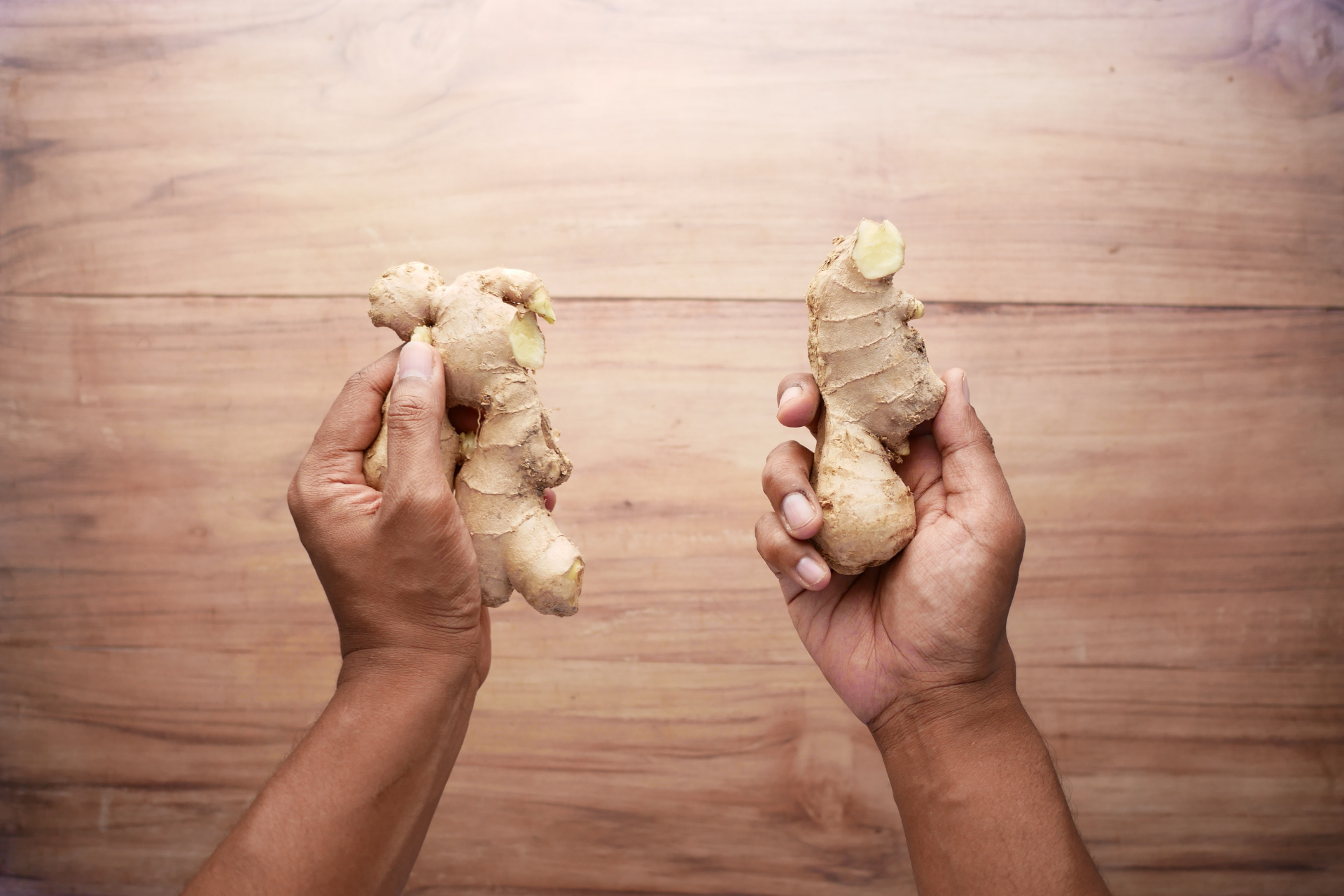
How to Use Ginger Effectively
Ginger’s versatility makes it easy to integrate into nearly any wellness routine. Whether you’re looking for digestive relief, immune support, or anti-inflammatory benefits, there’s a form of ginger to meet your needs. Understanding how to use ginger effectively ensures you get the most from its powerful properties.
Best Forms for Specific Conditions
Each form of ginger serves a unique purpose. Fresh ginger root is excellent for cooking and making tea. Its high water content and pungent flavor make it ideal for digestion and nausea relief. Powdered ginger is more concentrated and often used in baking or capsule form, perfect for daily supplementation.
Ginger tea benefits are well-documented, especially for sore throats, colds, or upset stomachs. Simply steep sliced fresh ginger in hot water, add lemon or honey if desired, and sip slowly. For joint pain or inflammation, ginger oil can be massaged onto sore areas to reduce swelling and increase circulation.
Capsules and tinctures are convenient options for those who prefer a more measured dose. They are especially useful when using ginger for chronic issues like blood sugar regulation, arthritis, or cholesterol management.
Recommended Daily Dosage
While ginger is generally safe, it’s important to use it in appropriate amounts. The average recommended daily intake is between 1 to 3 grams of dried ginger powder, or 4 to 5 grams of fresh ginger. For supplements, always follow the manufacturer’s guidelines or consult a healthcare provider.
Pregnant women should limit their intake to about 1 gram per day to avoid potential complications. Those on blood-thinning medications or with bleeding disorders should also consult a doctor before taking large amounts of ginger.
Moderation is key. Using ginger consistently in small amounts is far more effective and safer than taking large doses infrequently.
Easy Recipes and Preparation Tips
Incorporating ginger into meals is simple and delicious. Grated fresh ginger adds a warm, spicy kick to soups, stir-fries, smoothies, and marinades. Combine it with garlic and olive oil for a flavorful and health-boosting base for dishes.
Try blending fresh ginger with lemon, turmeric, and honey to make a detox shot. Or add a few slices to hot water for a calming evening tea. Ginger pairs well with citrus, cinnamon, apples, and carrots, making it a versatile addition to both savory and sweet recipes.
Whether cooked or raw, ginger retains much of its nutritional value, so don’t hesitate to get creative in the kitchen.
How to Peel, Slice, and Store Ginger Properly
Fresh ginger root can look intimidating, but it’s quite easy to handle. To peel, use the edge of a spoon rather than a knife to remove the skin—this avoids waste and helps preserve the flesh. Once peeled, slice, mince, or grate the root depending on your recipe.
Store fresh ginger in the refrigerator, wrapped in a paper towel and placed inside a sealed bag to extend its shelf life. You can also freeze whole pieces or chopped portions for long-term use.
For dried or powdered ginger, keep it in an airtight container in a cool, dark place. Always check the expiration date, as old ginger loses potency over time.

Is Ginger Ale Good for You?
While ginger root has a long-standing reputation for healing, ginger ale often brings mixed opinions. So, is ginger ale good for you? The answer depends on the type and ingredients. Some versions can offer mild benefits similar to ginger, but many commercial varieties are loaded with sugar and contain little to no real ginger.
What is Ginger Ale?
Ginger ale is a carbonated soft drink flavored primarily with ginger. It originated in the 19th century and was initially crafted as a health tonic. Over time, it evolved into a mainstream soda, often used to settle upset stomachs or mixed into cocktails.
Today’s commercial ginger ales typically contain carbonated water, high fructose corn syrup or cane sugar, ginger flavoring, and preservatives. Very few contain fresh ginger or even real ginger extract. That means many of the well-documented health benefits of ginger are absent in these mass-produced options.
On the flip side, homemade or natural ginger ale—made with real ginger root, sparkling water, lemon juice, and honey—can retain many of ginger’s original healing properties.
Types of Ginger Ale
There are generally two types of ginger ale: traditional and commercial.
1. Traditional ginger ales are fermented drinks made with fresh ginger, sugar, and yeast. They often resemble ginger beer and may contain probiotics, offering digestive support and some authentic ginger root benefits.
2. Commercial ginger ales, which dominate supermarket shelves, are mostly sugar-based soft drinks with minimal nutritional value. They may contain artificial ginger flavoring and sweeteners, making them more like soda than a wellness drink.
When shopping, always read the label. Look for ginger ale made with real ginger, minimal sugar, and no artificial ingredients.
Health Benefits of Ginger Ale
Despite its flaws, ginger ale—especially the natural kind—can offer mild therapeutic effects.
1. May reduce nausea: Ginger ale has long been a go-to remedy for upset stomachs. If made with real ginger, it may help relieve queasiness, motion sickness, or digestive discomfort.
2. May help treat migraines: Some anecdotal evidence suggests that ginger can reduce migraine severity. A ginger ale with real ginger might offer minor relief, though more research is needed.
3. May offer antioxidant effects: Real ginger extract contains antioxidants like gingerol, which fight free radicals. Unfortunately, most soft drink versions offer little of this benefit.
4. May support heart health: Natural ginger drinks may help regulate circulation and blood pressure, but the sugar content in commercial versions often cancels out these effects.
5. Naturally caffeine-free: One upside to ginger ale is that it’s usually caffeine-free, making it a better option than soda or energy drinks when you want to avoid stimulants.
Ginger vs. Ginger Ale
When it comes to ginger benefits and side effects, ginger root outperforms ginger ale. Whole ginger offers powerful anti-inflammatory, digestive, and immune-boosting effects. Ginger ale, on the other hand, often falls short, especially in sugary, mass-market forms.
In fact, the benefits of ginger root are largely absent in most store-bought ginger ales. Real ginger is what makes the difference, so it’s essential to know what’s in your drink.
If you’re reaching for ginger ale for health reasons, look for natural brands with real ginger or make your own. That way, you get the benefits without the drawbacks.
Potential Side Effects of Ginger Ale
While ginger ale may taste soothing, it comes with potential downsides.
1. Gassiness and bloating: The carbonation can cause gas and bloating, especially if consumed in large amounts.
2. Sugar content: Most commercial brands are high in added sugars, which can spike blood sugar, contribute to weight gain, and increase the risk of metabolic issues. This cancels out any ginger benefits that might be present.
3. Artificial sweeteners: Diet or zero-calorie versions often include artificial sweeteners, which may negatively affect gut health or cause headaches in some people.
4. Medication interactions: If the ginger ale contains real ginger, it might still interact with blood thinners or diabetes medications. Always check with your doctor if you’re using ginger regularly.
How to Choose a Healthier Ginger Ale
To maximize the health benefits of ginger from ginger ale, shop smart. Choose brands that list “real ginger” or “ginger extract” high on the ingredient list. Avoid options with high-fructose corn syrup, artificial flavors, or excessive preservatives.
Even better, make your own. Combine fresh grated ginger, sparkling water, lemon juice, and a touch of raw honey. This DIY approach gives you control over ingredients and ensures you’re getting actual ginger nutrition with each sip.
Risks and Side Effects of Ginger
Although ginger is widely considered safe and beneficial, like any powerful natural remedy, it’s not without its risks. Understanding the potential ginger benefits and side effects is essential, especially for individuals with specific medical conditions or those taking certain medications.
Possible Side Effects
For most people, moderate consumption of ginger—whether fresh, powdered, or in tea—is completely safe. However, when consumed in large doses (more than 4 grams per day), ginger may cause mild side effects such as:
- Heartburn: Ginger can stimulate acid production in the stomach, leading to a burning sensation in some individuals, particularly those prone to acid reflux.
- Gas and bloating: Though it can aid digestion, ginger may also produce gas in sensitive individuals.
- Mouth irritation: Fresh ginger can be quite pungent, and chewing or consuming large quantities may cause a burning feeling in the mouth or throat.
These effects are generally mild and resolve quickly, but it’s still a good idea to start with small amounts if you’re new to using ginger regularly.
Drug Interactions
One of the most important things to know about what ginger does for the body is how it interacts with medications. Ginger may affect how your body metabolizes certain drugs, especially those that influence blood clotting and blood sugar.
- Blood thinners: Ginger may increase the risk of bleeding when combined with anticoagulants like warfarin or aspirin.
- Diabetes medications: Ginger may lower blood sugar levels, potentially amplifying the effects of diabetes drugs and increasing the risk of hypoglycemia.
- High blood pressure medications: Ginger can affect circulation and blood pressure, which may interact with antihypertensive drugs.
If you’re on any of these medications, talk to your healthcare provider before taking ginger supplements or consuming large quantities of the root.
Who Should Avoid or Limit Ginger?
While ginger is safe for most people, certain groups should exercise caution or avoid it altogether.
- Pregnant women: Small doses of ginger are commonly used to treat morning sickness, but high doses may increase the risk of bleeding or affect hormone levels. Stick to 1 gram per day unless advised otherwise by a doctor.
- Individuals with bleeding disorders: Because ginger may affect platelet function, those with clotting disorders should avoid high doses.
- People scheduled for surgery: Ginger’s blood-thinning properties can increase bleeding risk during and after surgery, so it should be discontinued at least two weeks prior.
Despite these concerns, for the vast majority of people, the health benefits of ginger far outweigh the risks, especially when used responsibly and in moderation.
How to Buy, Store, and Preserve Ginger
Knowing how to choose, store, and preserve ginger properly ensures you always have this powerful root on hand, fresh, flavorful, and potent. Whether you’re a casual tea drinker or a committed health enthusiast, mastering ginger storage maximizes both its shelf life and its health benefits.
Selecting High-Quality Fresh Ginger
When buying fresh ginger root, look for firm, smooth, and plump rhizomes with thin, taut skin. Avoid roots that are wrinkled, soft, or showing signs of mold. The best ginger is heavy for its size, with a strong aroma and spicy, citrus-like fragrance.
Organic ginger is preferable when possible, as it’s grown without pesticides and is often fresher. If you can break off a small piece of the root and see that it’s juicy and moist inside, you’ve found a good one.
For powdered or dried ginger, choose a high-quality brand that states it contains 100% ginger with no fillers or additives. Always check the expiration date, and make sure the color is bright and uniform.
Best Practices for Storage
Fresh ginger can last for weeks when stored correctly. Wrap the unpeeled root in a paper towel, place it in a resealable bag, and store it in the vegetable drawer of your refrigerator. This keeps it fresh and prevents it from becoming soggy or moldy.
You can also freeze fresh ginger. Peel and slice or grate it before freezing, so it’s ready to use straight from the freezer. Frozen ginger retains most of its nutrients and is convenient for teas, stir-fries, or smoothies.
For dried ginger or powder, store it in an airtight container in a cool, dark place, away from heat and moisture. Proper storage preserves its potency and flavor, ensuring you get the full spectrum of ginger root benefits.
Preserving Ginger Long-Term
If you buy ginger in bulk or want to preserve it for long-term use, you have several options. Besides freezing, you can:
- Dehydrate slices of fresh ginger in a food dehydrator or oven at low heat, then grind into powder.
- Pickle ginger in vinegar and sugar, which is commonly used in Asian cuisine and can last for months in the fridge.
- Make ginger syrup or tincture, combining fresh ginger with honey or alcohol for long-term medicinal use.
These methods let you enjoy ginger benefits year-round and in multiple forms—culinary and medicinal.
Getting the Most Out of Your Ginger
To maximize the ginger nutrition facts in your food, try to use fresh ginger whenever possible. Heat can break down gingerol, transforming it into other compounds like zingerone, which still offers benefits but is less potent. For stronger anti-inflammatory effects, add ginger toward the end of the cooking process.
And don’t throw away the peel too quickly—if your ginger is organic, the skin is edible and contains nutrients too. Just be sure to scrub it well.
By understanding how to buy, store, and preserve ginger effectively, you can maintain a steady supply of one of nature’s most powerful healing plants.
Uses of Ginger
Ginger’s versatility extends far beyond the spice rack. Whether used in the kitchen, as a home remedy, or in natural skincare, this root has a place in every aspect of wellness. Understanding the many uses of ginger can help you tap into its full potential and enjoy a wide range of ginger benefits daily.
1. Culinary Uses
Culinary application is the most common and enjoyable way to use ginger. It’s a staple in Asian, Indian, and Middle Eastern cuisines, known for its warm, spicy-sweet flavor that elevates everything from soups to desserts.
Fresh ginger root can be grated into stir-fries, added to soups and sauces, or blended into smoothies for a zesty kick. Dried ginger powder is used in baking, think gingerbread, cookies, and muffins, and in spice blends like curry powder or chai.
One of the simplest and most effective ways to consume ginger for its health benefits is to steep it in tea. A cup of hot ginger tea can calm the stomach, soothe inflammation, and help fight off colds.
You can also make wellness shots by juicing ginger with lemon, turmeric, and a touch of honey—perfect for an immunity boost.
2. Topical Applications
Ginger isn’t just good for internal health, it can be applied to the skin as well. Ginger oil or poultices are used in natural medicine to relieve muscle aches, joint pain, and stiffness. The warming effect of ginger helps improve blood flow and reduce inflammation at the application site.
For skin health, ginger’s antioxidant properties can help reduce signs of aging and improve tone. Some people use ginger-infused facial masks to brighten the complexion and reduce blemishes. Always perform a patch test first, as ginger can be irritating to sensitive skin.
Topically, it’s also used in scalp treatments to help stimulate hair growth, thanks to its ability to increase circulation and combat dandruff-causing microbes.
3. In Supplements and Natural Remedies
For more targeted health benefits, ginger is available in supplement form, capsules, tablets, tinctures, and even gummies. These are often standardized to contain a consistent amount of gingerol, which is ideal for those looking to treat chronic issues like inflammation, menstrual pain, or blood sugar imbalance.
What is ginger good for in supplement form? It’s especially effective for arthritis, digestive health, and reducing nausea in chemotherapy patients. Supplements are also convenient for people who don’t like the taste of ginger or don’t have time to prepare it fresh.
Natural remedy enthusiasts often combine ginger with other herbs like turmeric, cinnamon, or garlic for synergistic effects. These combinations can provide enhanced anti-inflammatory, immune-boosting, and heart-healthy benefits.
4. Holistic Wellness and Ritual Use
In traditional healing systems such as Ayurveda and Traditional Chinese Medicine (TCM), ginger is used to balance the body’s energy. It’s considered a warming herb that can stimulate circulation and digestive fire (called Agni in Ayurveda).
Whether you’re drinking ginger tea before meditation, adding it to a detox bath, or using it in aromatherapy, ginger supports mind-body wellness from multiple angles.
From everyday cooking to natural healing, ginger’s benefits are endless when you make this root a regular part of your routine.
Final Thought on Health Benefits of Ginger
The health benefits of ginger are as vast as they are impressive. From its origins in ancient herbal medicine to its prominent place in today’s wellness trends, ginger has proven itself to be one of the most powerful and versatile natural remedies available.
Backed by science and tradition, ginger is an all-in-one solution for inflammation, digestion, immunity, cardiovascular support, and more.
Whether you’re seeking relief from nausea, managing chronic pain, enhancing brain health, or just trying to support your immune system, ginger delivers. The wide variety of ways to consume it, from teas and tinctures to capsules and stir-fries, makes it incredibly easy to incorporate into any lifestyle.
Still wondering, is ginger good for you? The answer is a resounding yes. The root not only addresses immediate symptoms like stomach upset and sore throat but also plays a proactive role in long-term wellness by reducing disease risk and promoting balance throughout the body.
To truly tap into the full spectrum of ginger benefits, make it a consistent part of your daily routine. Start with a cup of ginger tea, toss some fresh ginger into your next meal, or try a supplement formulated for your specific health needs. However you choose to use it, ginger has earned its reputation as a genuine superfood, with real, proven results.
